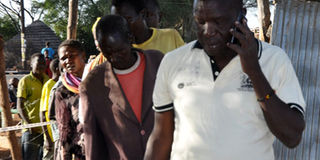Prime
Consequences of lining up for LC polls will be dire

Lining up behind candidates might bring social disharmony since it is easy for leaders to identify the people who did not vote for them. FILE PHOTO.
What you need to know:
- Social disharmony. The proposal to elect LCI and LCII leaders by lining up is likely to have far reaching consequences both in the long and short term. It will not only disenfranchise some members of society but is likely to create social disharmony, writes Crispin Kaheru.
Over the last couple of weeks, the debate on the method of conducting LCI and LCII elections by lining-up (open voting or mlolongo) has generated debate.
The advocates self-consciously say the system is cheaper than conducting the elections through the ballot. However little attention has been paid to short and long term consequences.
But let us try to explore some of the concerns that continue to filter through about the proposed method.
Many voters feel apprehensive towards making their electoral choice known publicly, and are therefore likely to stay away or refrain from voting under the proposed method.
We are already grappling with low voter turnup. For instance in the just concluded LCV and LCIII elections, voter turnout went as low as 30 per cent in some areas.
If we pursue an open voting method, the country should expect even lower voter turnout.
In the 80s and 90s, Daniel Arap Moi abolished the secret ballot elections in Kenya, introducing “mlolongo” – Kiswahili for lining-up.
Under this system, voters simply lined up behind the candidate of their choice during Kanu political party primary elections. This is similar to the proposed method for the LC and LCII elections in Uganda.
Polling officers drawn from the provincial administration then counted the voters but only declared candidates winners as preferred by the Moi power centre.
In many villages, those who did not vote for Moi’s ‘preferred’ candidates were branded “disloyal” and suffered post-election intimidation and persecution.
People therefore stayed away in subsequent elections and during the 1988 Kanu primary elections, less than 15 per cent of the eligible voters participated.
It is therefore very likely that if this system is used people will either refrain from voting or will be looking over their shoulders to see who is trailing them or what might happen to them – after the elections.
Generally, experiences from Kenya where the lining-up method was once used show that the process was marked by kidnappings, intimidation, and violence, poll-rigging and tireless guile.
Since government’s announcement to conduct LCI and LCII elections using the lining-up voting method, people have expressed weariness about what will happen to them after participating in an election that exposes their choice.
There is concern that under the proposed method, it will be easy for elected leaders to identify voters who did not choose then and deny them services as a way of retribution.
Uganda also risks undermining social cohesion because during elections, political tensions rise.
Previous elections have registered various incidents where competing political camps intimidate, fight and act in belligerent ways against each other.
If such incidents occur in a context where people are voting in secrecy, imagine a context where one votes in the open and where competing supporters see the choices that voters are making.
This would potentially be a birthplace for contentions, mistrust and conflict among locals. For a country whose recent incidents – such as in the Rwenzori region, Teso, northern Uganda and Buganda - may point to a fragile social cohesion fabric, it is critical that we hold elections in ways that will strengthen rather than undercut unity and harmony of the people.
Open voting also creates obvious difficulties for the electoral officers to participate in the voting.
On one hand they have to play the role of electoral umpires, yet on the other they have to fulfill their civic duty – in the open.
Would they be trusted as impartial by the electorate after they have been seen lining up behind their preferred candidates or making their choice publically known?
The other option for them would be to oversee the voting process and give up on their civic duty.
If we have (at minimum) two or three polling officials designated to manage elections at each village (58,000 villages), it means that we will have (at minimum) about 120,000 people being disenfranchised in the village elections – simply because they dedicated themselves to administering elections.
Many countries today have moved to a level where they designate advance voting for election officials or deploy election officials in areas where they will be able to vote.
With an open voting system, it is difficult to integrate special or advance voting for election administrators or even give them preferential treatment to vote on the actual polling day.
The proposed method therefore does not pay attention to issues around conflict of interest of administrators; neither does it safeguard their obligation to remain impartial.
Because of these reasons, it is naturally likely that election administrators will undertake their role of convening elections in villages and parishes but will unfairly be disenfranchised.
This method also compromise the participation of community leaders, such as traditional and cultural leaders, religious leaders, security personnel and other eminent persons who under the law or by the virtue of their office or status in society are supposed to be seen as impartial.
For instance, what effect would it have if the Kabaka of Buganda or Omukama of Bunyoro or any other cultural or traditional leader exposed his electoral choice?
Imagine a prominent political party member who lines up for a candidate from another political party? Imagine a religious leader making his electoral choice in the open?
What impression would this create among his or her flock? Imagine spouses knowing they have voted for different candidates – especially in Uganda’s patriarchal society?
The after effects would be far-reaching including immediately straining social cohesion within the community and among families.
Likewise, if security personnel showed their electoral choices publically, this would not only spew mistrust within security agencies but would also enlist suspicion and misgivings from the public towards the neutrality of institutions of security.
If for instance a PISO, GISO or DISO is seen voting for an opposition or independent candidate, this is likely to be interpreted as questioning the establishment, and could tantamount to disloyalty or betrayal.
A free and fair election should never reveal one’s vote. But under open voting, people holding sensitive positions will be scared of lining up and revealing whose side they are on.
As a result, they will either refrain from voting or vote the safest option in accordance to their position rather than voting for their actual preferred candidate.
There is also concern around the procedural aspects of these elections. Procedures and guidelines around voter registration, campaigning, voter education and polling day administration are not yet available.
There are questions around whether the procedures will resonate with set standards.
For instance, if the proposed method of election (lining up) is pursued, will the Election Day, be declared a public holiday? Will there be specific hours designated for elections to ensure that every voter is at the polling station at the same time? Will the proposed procedures take into account that some villages could have more than 2,000 voters – what will be the practicality of counting such large numbers for all the elective positions involved?
Therefore the currently designated method of voting in the LCI and LCII elections therefore not only fails to meet the minimum acceptable standards, but is also fertile ground for inciting conflict– thus undermining the hard earned peace, stability and unity in many parts of the country.
While it is very important that these elections are held urgently to bridge the grass roots leadership gaps, it is critical that the responsible institutions review the method of voting, with the aim of providing a system where voters elect their representatives in secrecy.
Government should be seen to be fostering social cohesion through promoting electoral processes that are inclusive, participatory and processes that hold society together.
The secret ballot system not only protects the voter, but also provides confidence to the voter to freely participate without a threat of being castigated for their choice.
Issues
Apprehensive: Many voters are likely to feel apprehensive towards making their electoral choice known publicly.
Social disharmony: There is fear that social disharmony might increase since it is easy for elected leaders to identify voters who did not choose them and deny them services as a way of retribution.
Electoral officers: Open voting also makes it difficulties for electoral officers to participate in the voting. Whereas they have to play the role of electoral umpires, they have to fulfil their civic duty. But how does such as officer ensure that their civic duty is fulfilled in the open without creating biases.
120,000
The number of electoral officials who could be disfranchised if the method of open voting is implemented.




